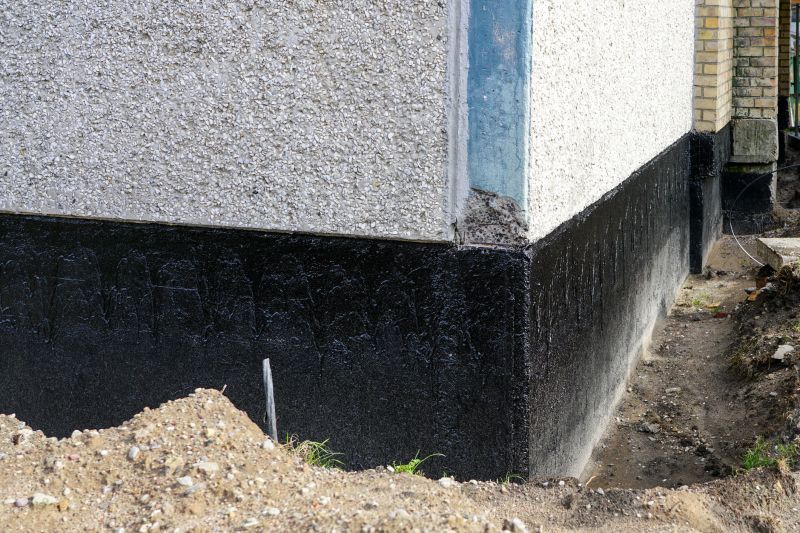Ultimate Guide To Foundation Waterproofing Products For Complete Protection
Get insights into essential waterproofing materials and their key features to safeguard your home’s foundation.
 Foundation waterproofing is a crucial aspect of maintaining the integrity and longevity of a building's structure. Proper waterproofing prevents water infiltration that can cause damage such as cracks, mold growth, and deterioration of foundation materials. There are various products available designed to create a moisture-resistant barrier, each suited to different types of foundations and environmental conditions. Selecting the right waterproofing solution involves understanding the specific needs of the project, including the foundation type, soil conditions, and exposure risks.
Foundation waterproofing is a crucial aspect of maintaining the integrity and longevity of a building's structure. Proper waterproofing prevents water infiltration that can cause damage such as cracks, mold growth, and deterioration of foundation materials. There are various products available designed to create a moisture-resistant barrier, each suited to different types of foundations and environmental conditions. Selecting the right waterproofing solution involves understanding the specific needs of the project, including the foundation type, soil conditions, and exposure risks.
Top Overall Option
Flexible Liquid Waterproof Coating
A versatile liquid coating that provides a seamless, flexible barrier against water intrusion. Suitable for various foundation surfaces, it adheres well and offers durable protection with easy application. Ideal for both new construction and retrofit projects, it helps maintain the structural integrity of foundations over time.
Types of Products For Foundation Waterproofings
Liquid Waterproofing Membranes
Applied as a liquid, these membranes cure into a seamless, flexible barrier that resists water penetration and can accommodate slight foundation movements.
Bituminous Membranes
Self-adhesive or torch-applied membranes made from asphalt or bitumen, offering durable, waterproof layers for foundations and basements.
Polyurethane Sealants
High-performance sealants used to fill cracks and joints, preventing water seepage at vulnerable points.
Cementitious Coatings
Waterproof coatings made from cement-based materials that can be applied directly onto foundation surfaces for a protective layer.
Liquid Rubber Coatings
Flexible, rubberized coatings that form a waterproof barrier suitable for various foundation surfaces.
Asphalt Emulsions
Water-based asphalt products that can be sprayed or brushed onto foundations for water resistance.
Polyurea Coatings
Rapid-curing coatings that provide high durability and waterproofing for foundations exposed to harsh conditions.
Hydrophobic Sealants
Sealants that repel water and prevent moisture ingress through small cracks and pores.
Drainage Boards
Protective layers installed over foundation walls to facilitate water drainage and prevent hydrostatic pressure buildup.
Waterproofing Admixtures
Additives mixed into concrete to reduce porosity and improve internal water resistance.
Spray-On Membranes
Sprayable waterproof barriers that conform to complex foundation shapes and details.
Sheet Membranes
Pre-formed waterproof sheets made of rubber or asphalt that are adhered to foundation surfaces.
Crack Repair Sealants
Specialized sealants designed to fill and seal cracks in foundations to prevent water intrusion.
Vapor Barriers
Materials installed on or under foundations to prevent moisture vapor transmission.
Popular Choices
Widely used for their ease of application and seamless coverage, these coatings are popular among DIY enthusiasts and professionals alike.
Known for their durability and strong water resistance, these membranes are frequently selected for foundation waterproofing projects.
Preferred for sealing cracks and joints due to their flexibility and adhesion properties.
Popular for their compatibility with concrete surfaces and straightforward application process.
Favored for their elastic properties and long-lasting performance on various foundation types.
Chosen for their affordability and ease of application, especially in large-scale projects.
Selected for their rapid curing and high durability in demanding environments.
Popular for small repairs and preventative maintenance due to their water-repelling properties.
Commonly used to enhance water management around foundations and reduce hydrostatic pressure.
Waterproofing products for foundations can be broadly categorized into liquid coatings, membranes, sealants, and admixtures. Liquid coatings are applied directly to the foundation surface and form a seamless barrier that resists water penetration. Membranes, often made of rubber or asphalt, can be applied as sheets or sprays and are effective in providing durable protection. Sealants are typically used to fill small cracks and joints, preventing water seepage through gaps. Admixtures are added to concrete mixes to enhance their water resistance from within. Each of these options offers different advantages in terms of ease of application, durability, and compatibility with existing structures.
Choosing the appropriate waterproofing product depends on several factors including the foundation's exposure level, the climate, and the project's budget. It is important to consider the product's adhesion properties, flexibility, and resistance to UV and chemicals. Proper surface preparation, application techniques, and adherence to manufacturer instructions are essential to achieve optimal results. Regular inspections and maintenance can extend the lifespan of waterproofing measures, ensuring the foundation remains protected over time. Consulting with a professional can help determine the best solution tailored to specific building needs.
Key Buying Considerations
- Compatibility with existing foundation materials and surfaces
- Level of water exposure and environmental conditions
- Ease of application and drying time
- Flexibility and ability to accommodate foundation movement
- Adhesion strength and bonding to surfaces
- Durability and resistance to UV, chemicals, and weathering
- Coverage area and application thickness requirements
- Type of waterproofing (liquid, sheet, sealant, admixture) suitable for your project
- Compatibility with other building materials and systems
- Ease of future maintenance and inspection
- Cost considerations and overall project budget
- Local building codes and regulations compliance
- Professional installation requirements or DIY feasibility
- Environmental conditions like soil type and moisture levels
- Longevity and expected lifespan of the waterproofing solution
